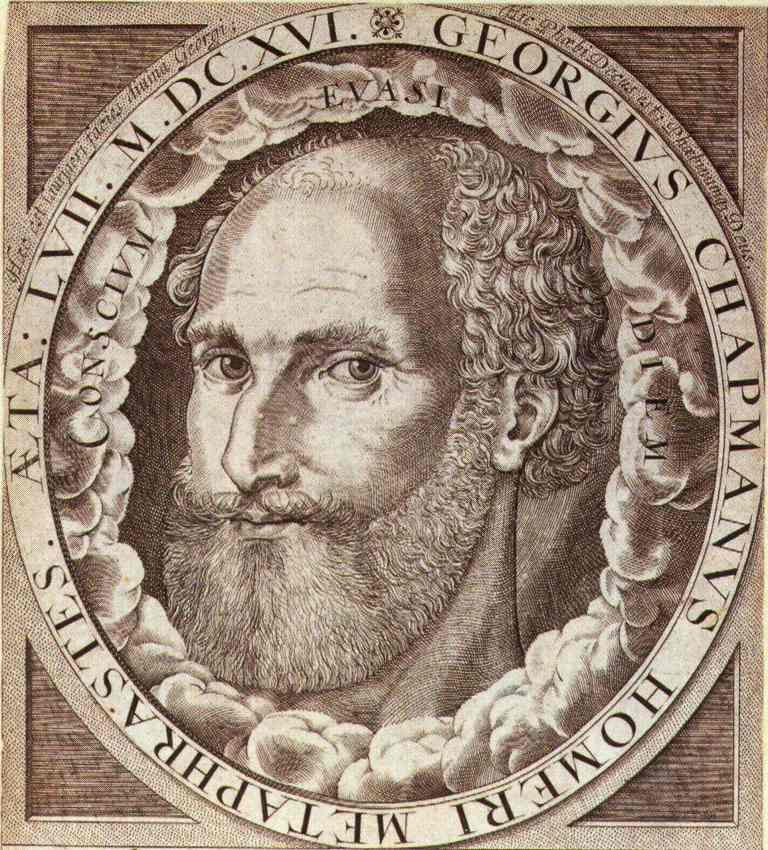
George Chapman citáty a výroky

George Chapman: Citáty anglicky
“As far as white Aurora's dews are sprinkled through the air.”
Book VII, line 374, p. 104
The Iliads of Homer, Prince of Poets (1611)
“Each natural agent works but to this end,—
To render that it works on like itself.”
Act III, scene i.
Bussy D'Ambois (1607)
Book VI, line 506, p. 94
The Iliads of Homer, Prince of Poets (1611)
Hymnus in noctem, line 398
The Shadow of Night (1594)
“Love is a golden bubble, full of dreams,
That waking breaks, and fills us with extremes.”
Hero and Leander: a poem (1600), begun by Christopher Marlowe, and finished by George Chapman. Sestiad III.
Book XXIV, line 494, p. 336
The Iliads of Homer, Prince of Poets (1611)
“Virtue is not malicious; wrong done her
Is righted even when men grant they err.”
Monsieur D'Olive, Act I, scene i; reported in Bartlett's Familiar Quotations, 10th ed. (1919).
“Obscuritie in affection of words, & indigested concets, is pedanticall and childish…”
Preface to Ovid's Banquet of Sense (1595)
Act III, scene i; reported in Bartlett's Familiar Quotations, 10th ed. (1919).
The Conspiracy and Tragedy of Charles, Duke of Byron (1608)
“The lady of the light, the rosy-fingered Morn,
Rose from the hills.”
Book I, line 460, p. 11
The Iliads of Homer, Prince of Poets (1611)
“Promise is most given when the least is said.”
Musæus of Hero and Leander; reported in Bartlett's Familiar Quotations, 10th ed. (1919).
“Man is a name of honour for a king.”
Act IV, scene i.
Bussy D'Ambois (1607)
Book III, line 167, p. 41
The Iliads of Homer, Prince of Poets (1611)
“This was a sleight well mask'd. O, what is man,
Unless he be a Politician?”
Act I, scene i.
Bussy D'Ambois (1607)
“Tis immortality to die aspiring,
As if a man were taken quick to heaven.”
Act I, scene i; reported in Bartlett's Familiar Quotations, 10th ed. (1919).
The Conspiracy and Tragedy of Charles, Duke of Byron (1608)
“Fair words never hurt the tongue.”
Act IV, scene i.
Eastward Hoe (1605)
“I know an Englishman,
Being flattered, is a lamb; threatened, a lion.”
Alphonsus, Emperor of Germany (1654), Act I, scene ii, lines 208–209. Attributed, probably falsely, to Chapman. Perhaps by George Peele.
Disputed
Act III, scene i.
The Conspiracy and Tragedy of Charles, Duke of Byron (1608)
“To put a girdle round about the world.”
Act I, scene i.
Bussy D'Ambois (1607)
“Let pride go afore, shame will follow after.”
Act IV, scene i.
Eastward Hoe (1605)
An Humorous Day's Mirth; reported in Bartlett's Familiar Quotations, 10th ed. (1919).
Revenge for Honour, Act V, scene ii; reported in Bartlett's Familiar Quotations, 10th ed. (1919).
Disputed
Poor envious souls they are that cavil at truth's want in these natural fictions; material instruction, elegant and sententious excitation to virtue, and deflection from her contrary, being the soul, limbs, and limits of an authentical tragedy.
The Revenge of Bussy D'Ambois (1613)
